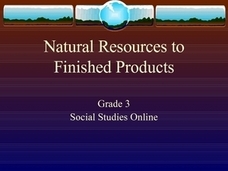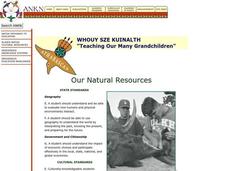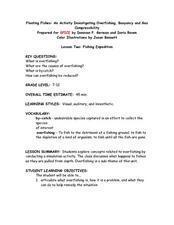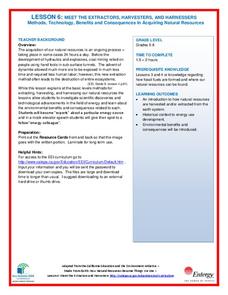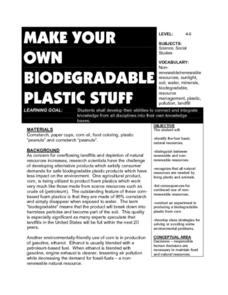EduGAINs
Consumerism, Me and the Natural Environment— Canadian and World Studies
Just as no man is an island, no country is totally independent of other countries. To understand the impact of individual consumer decisions on the global natural environment, class groups consider how the stuff they purchase connects to...
US Environmental Protection Agency
Non-Point Source Pollution
Investigate the different types of pollution that storm drain runoff carries into oceans, lakes, rivers, and streams with this class demonstration. Using an aquarium and an assortment of everyday items that contaminants like motor oil,...
Curated OER
Kids Need Natural Resources
Third graders define renewable and non-renewable resources and give multiple examples of each type of resource. In this environmental science lesson, 3rd graders sort picture cards into two categories, renewable and non-renewable...
Lerner Publishing
Living or Nonliving
It's alive! Or is it? Through a series of shared readings, whole class activities, and independent exercises children explore the difference between living and non-living things, creating a pair of printable books to demonstrate their...
Curated OER
Naturally Speaking
Learners identify the Earth's natural resources and classify them as renewable or non-renewable. They simulate the distribution of resources and discuss the fairness and effectiveness of the distribution. They identify ways that they use...
Curated OER
Renewable vs. Non-Renewable Resources
Fifth graders identify renewable vs. non-renewable resources and comprehend why conservation of resources is important. They are asked what they think the words natural and resource mean. Pupils then put the words together to define...
Curated OER
Natural Resources to Finished Products
This PowerPoint provides definitions and related illustrations for "natural resources," "renewable resources," and "non-renewable resources." Instructions for a classroom activity locating resources is included.
Curated OER
Natural Disaster Risk at Home
Students analyze the natural disater threat and potential mitigation techniques of their (parents?) home. They apply classroom knowledge to students, non-academic daily life. Students recongize how earth processes specifically affect...
Curated OER
Life Science Observations: Living vs. Non Living Things
Students investigate the difference between living and non-living things. In this life science lesson plan, students discover the different characteristics of living things and the natural or human created non-living things. Students...
Curated OER
Non-violent Protest Through The Ages
Young scholars are introduced to non-violent ways to solve disagreements with others. In groups, they analyze the ways Martin Luther King, Gandhi and Thoreau shared their views in non-violent ways. They complete a sketch of the life of...
Curated OER
The Natural Selection of Stick-Worms
Students discuss and role-play the elements of natural selection. They use toothpicks to represent Stick-Worms and discover the mechanisms of change of traits in populations.
Curated OER
Natural Resource Awareness
Seventh graders design a collage that shows natural resources or things made from natural resources. They discuss the collages and decide how they use natural resources at home and school. They listen to a read aloud of a Native American...
Curated OER
Our Natural Resources
Pupils discuss key terms used to describe ecosystems and how humans are altering natural resources. They listen to the book, Grandfather's Wisdom, and list the renewable and nonrenewable resources they have used or consumed in the past...
Curated OER
Floating Fishes: Fishing Expedition
A referenced PowerPoint is not included, but this lesson can still make an impact with emerging environmentalists. After introducing them to the facts about overfishing, they experiment with a fishing simulation using colored beads and...
Channel Islands Film
Natural Resources, and Human Uses of Plants and Animals
As part of their study of the restoration projects on Santa Cruz Island, class members demonstrate their understanding of the connections among plant life, animals, and the actions of humans by crafting a model that reveals these...
National Wildlife Federation
Meet the Extractors, Harvesters, and Harnessers: Methods, Technology, Benefits and Consequences in Acquiring Natural Resources
There are advantages and disadvantages to all sources of energy; the trick is determining which one has the least impact! Part six in the series of 12 has learners further explore energy resources. After reading information about one of...
Curated OER
Natural Selection.... a Cumulative Process... it's in the cards!
Students working in pairs attempt to produce a full sequence of 13 cards of one suit (ace - to king). This must be done by shuffling the suit of cards for each round, then checking the cards.
Curated OER
Explore Your Natural Habitat
Students identify habitats and understand why they are important to our environment. For this environmental lesson students design their own habitat, observe and record data on the impact their habitat has on the environment.
Journey Through the Universe
Is There Anyone Out There?
What is an alien's favorite game? All-star baseball! Scholars start defining living and non-living. Then, they conduct experiments to research if life exists, keeping in mind that life could be in many forms, not just human.
Curated OER
Introducing the Essay: Twain, Douglass, and American Non-Fiction
Young scholars analyze American essayists Mark Twain and Frederick Douglass in an introduction to American literary non-fiction writing. In this essay history lesson, students identify methods for writing essays. Young scholars read and...
Curated OER
Boy Scout Merit Badge: Nature
In this boy scout merit badge: nature worksheet, 8th graders research the topic using the websites listed, answer 4 detailed questions about plants, animals, and the environment, then perform specific tasks of identifying in the field,...
Curated OER
Fourth Grade Social Studies
In this social studies worksheet, 4th graders complete multiple choice questions about the Constitution, natural resources, economics, and more. Students complete 25 multiple choice questions.
Curated OER
Make Your Own Biodegradable Plastic Stuff
Students identify the four basic natural resources. They distinguish bettween renewable and non-renewable resources. Pupils recognize that all natural resources are needed by living plants and animals. Students list consequences for...
Curated OER
Crater Creation
After looking at the back of a quarter featuring Oregon terrain, learners distinguish between fiction and non-fiction and identify the beginning, middle and end of a story. First, they listen to legends that describe the creation of...
Other popular searches
- Drama Non Naturalism
- Drama+ Non Naturalism
- Non Naturalism Theater
- Non Naturalism Year 12
- Non Naturalism in Drama
- Non Naturalism Theatre
- Drama Non Naturalism








